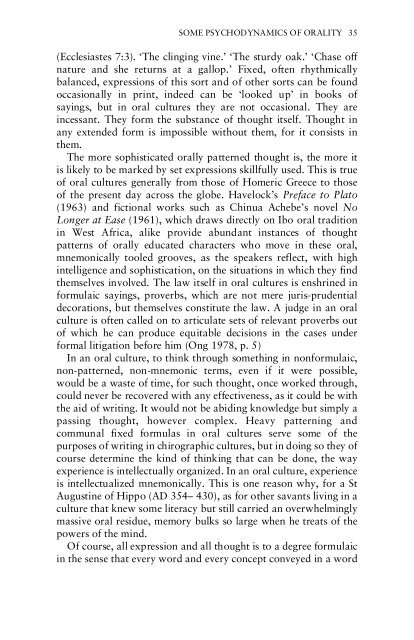Orality and Literacy: The Technologizing of the Word - Monoskop
Orality and Literacy: The Technologizing of the Word - Monoskop
Orality and Literacy: The Technologizing of the Word - Monoskop
Create successful ePaper yourself
Turn your PDF publications into a flip-book with our unique Google optimized e-Paper software.
SOME PSYCHODYNAMICS OF ORALITY 35<br />
(Ecclesiastes 7:3). ‘<strong>The</strong> clinging vine.’ ‘<strong>The</strong> sturdy oak.’ ‘Chase <strong>of</strong>f<br />
nature <strong>and</strong> she returns at a gallop.’ Fixed, <strong>of</strong>ten rhythmically<br />
balanced, expressions <strong>of</strong> this sort <strong>and</strong> <strong>of</strong> o<strong>the</strong>r sorts can be found<br />
occasionally in print, indeed can be ‘looked up’ in books <strong>of</strong><br />
sayings, but in oral cultures <strong>the</strong>y are not occasional. <strong>The</strong>y are<br />
incessant. <strong>The</strong>y form <strong>the</strong> substance <strong>of</strong> thought itself. Thought in<br />
any extended form is impossible without <strong>the</strong>m, for it consists in<br />
<strong>the</strong>m.<br />
<strong>The</strong> more sophisticated orally patterned thought is, <strong>the</strong> more it<br />
is likely to be marked by set expressions skillfully used. This is true<br />
<strong>of</strong> oral cultures generally from those <strong>of</strong> Homeric Greece to those<br />
<strong>of</strong> <strong>the</strong> present day across <strong>the</strong> globe. Havelock’s Preface to Plato<br />
(1963) <strong>and</strong> fictional works such as Chinua Achebe’s novel No<br />
Longer at Ease (1961), which draws directly on Ibo oral tradition<br />
in West Africa, alike provide abundant instances <strong>of</strong> thought<br />
patterns <strong>of</strong> orally educated characters who move in <strong>the</strong>se oral,<br />
mnemonically tooled grooves, as <strong>the</strong> speakers reflect, with high<br />
intelligence <strong>and</strong> sophistication, on <strong>the</strong> situations in which <strong>the</strong>y find<br />
<strong>the</strong>mselves involved. <strong>The</strong> law itself in oral cultures is enshrined in<br />
formulaic sayings, proverbs, which are not mere juris-prudential<br />
decorations, but <strong>the</strong>mselves constitute <strong>the</strong> law. A judge in an oral<br />
culture is <strong>of</strong>ten called on to articulate sets <strong>of</strong> relevant proverbs out<br />
<strong>of</strong> which he can produce equitable decisions in <strong>the</strong> cases under<br />
formal litigation before him (Ong 1978, p. 5)<br />
In an oral culture, to think through something in nonformulaic,<br />
non-patterned, non-mnemonic terms, even if it were possible,<br />
would be a waste <strong>of</strong> time, for such thought, once worked through,<br />
could never be recovered with any effectiveness, as it could be with<br />
<strong>the</strong> aid <strong>of</strong> writing. It would not be abiding knowledge but simply a<br />
passing thought, however complex. Heavy patterning <strong>and</strong><br />
communal fixed formulas in oral cultures serve some <strong>of</strong> <strong>the</strong><br />
purposes <strong>of</strong> writing in chirographic cultures, but in doing so <strong>the</strong>y <strong>of</strong><br />
course determine <strong>the</strong> kind <strong>of</strong> thinking that can be done, <strong>the</strong> way<br />
experience is intellectually organized. In an oral culture, experience<br />
is intellectualized mnemonically. This is one reason why, for a St<br />
Augustine <strong>of</strong> Hippo (AD 354– 430), as for o<strong>the</strong>r savants living in a<br />
culture that knew some literacy but still carried an overwhelmingly<br />
massive oral residue, memory bulks so large when he treats <strong>of</strong> <strong>the</strong><br />
powers <strong>of</strong> <strong>the</strong> mind.<br />
Of course, all expression <strong>and</strong> all thought is to a degree formulaic<br />
in <strong>the</strong> sense that every word <strong>and</strong> every concept conveyed in a word

















